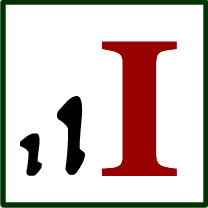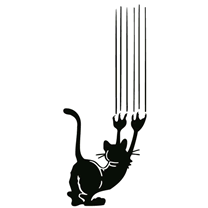
Here’s a recording in a mystery language.
Can you identify the language, and do you know where it’s spoken?

Here’s a recording in a mystery language.
Can you identify the language, and do you know where it’s spoken?

I learned an interesting French word last night: maille [maj], which means stitch or mesh and appears in such expressions as:
– maille à l’endroit = plain stitch
– maille à l’envers / tombée / coulée = purl stitch
– maille Jersey = stocking stitch
– doublure maille = mesh lining
– maille du tricot = knitting stitch
– maille du crochet = crochet stitch
– à maille serrée = close-woven
– avoir maille à partir = to be in trouble
– avoir maille à partir avec qn = to have a brush with sb
– à mailles fines = with a fine mesh
– passer à travers les mailles du filet = to slip through the net
– cotte de maille(s) = coat of mail; chainmail
Maille comes from the Old French maille (loop, stitch, mesh, link), from Vulgar Latin *macla, from Latin macula (spot, speck, stain; mesh; cell) from From Proto-Italic *smatlo-, from Proto-Indo-European *smh₂tlo- (possibly meaning “wiping”).
The English word mail, as in chainmail, comes from the same root via the Middle English maille (mail armour) the Old French maille.
The English word mail, as in letters and parcels, originally meant a bag or wallet, and came to mean a bag containing letters to be delivered by post, and then the letters themselves. It comes from the Middle English male, from the Anglo-Norman male, Old French male (bag, wallet), from the Frankish *malha (bag), from the Proto-Germanic *malhō (bag, pouch), from the Proto-Indo-European *molko- (leather pouch).
*molko- is also the root of the French words malle (large suitcase, trunk) and mallette (briefcase); and the Spanish mala (suitcase, mailbag, mail, post), and maleta (suitcase).
Mail (letters) in French is (le) courrier and the postal service is la poste. Email is officially courriel or courrier électronique, though many people use e-mail. Courrier is borrowed from the Italian corriere (messenger, courier), from correre (to run, hurry, rush), from the Latin currere, from currō (to run, hurry), from Proto-Italic *korzō (to run), from Proto-Indo-European *ḱers- (to run), also the root of the English words courier and current.
Sources: Reverso, Wiktionary

There’s an interesting article about tonal languages in The Atlantic that I came across today. It explains that most tonal languages are found in East and Southeast Asia, sub-Saharan Africa;, and in Mexico, and speculates that this might have something to do with climate – I think that unlikely.
It also explains how words can come to be distinguished by tones. In some dialects of Khumu, an Austroasiatic language spoken in parts of Laos, Vietnam, Thailand and China, tones are used, while in other dialects they aren’t.
In the Khmu Rook dialect of northern Laos, for example, there are six tones. In other dialects pok means “bite” and bok means “to cut down a tree” – there may be a slight difference in intonation between them, but this is not used to distinguish them. In Khmu Rook b and p have merged and these words are only distinguished by tones: pok with a high tone means “bite,” and with a low tone means “to cut down a tree”.
The process by which a language acquires tones is known as tonogenesis.

Here’s a recording in a mystery language.
Can you identify the language, and do you know where it’s spoken?

Have you ever wondered why the first person pronoun in English (I) is always written as a capital letter?
I was asked about this the other day and though I would investigate.
According to a blog post on Dictionary.com, it came about as a bit of an accident. In Old and Middle English the equivalent of I was ıc [iʧ], which was written uncapitalized. Its pronouncation changed over time and the c disappeared. On its own the ı looked weak, so scribes started writing it a bit taller, and by the 14th century is was typically capitalized.
According to a post on English Language & Usage, i was originally written without a dot as ı. It started to be written as slightly elongated when on its own or in Roman numerals when the last of several ı’s. This might have been to avoid confusion with punctuation marks, or with u, n or m.
A dot, or tittle, started to be used in manuscripts during the 11th century to distinguish i and j from other letters. Originally it was larger, but shrunk over time.
More information: http://blog.dictionary.com/tittle/

The first cartoons, in the sense of humorous or satirical drawings, appeared in the magazine Punch in 1843, however the word was used from the 1670s to mean “a drawing on strong paper (used as a model for another work)”.
Cartoon can also mean:
– An artist’s preliminary sketch.
– An animated film
– A diagram in a scientific concept.
Cartoon comes from French carton (cardboard, carton, cardboard box, target, sketch; cartoon, inset map, card), from the Italian cartone (cardboard, paperboard, a carton, a box, a cartoon (an artist’s preliminary sketch or an animated cartoon)), from the Latin charta (paper, map, menu), from the Ancient Greek χάρτης (khártēs – papyrus, paper), from χαράσσω (kharássō – I scratch, inscribe), from the Proto-Indo-European *ǵʰer- (to scratch).
A series of cartoons is known as a comic strip or strip cartoon, and the section of a newspaper containing cartoons and comic strips is apparently known as the funnies, the funny papers or the funny papers, at least in some English-speaking countries – I wouldn’t use these words, and might call it the cartoon section. How about you?
Comic comes from Latin comicus (comic, comedy, comedian), from the Ancient Greek κωμικός (kōmikós – relating to comedy), from κῶμος (kômos – carousal).
Sources: Online Etymology Dictionary and Wiktionary

Here’s a recording in a mystery language.
Can you identify the language, and do you know where it’s spoken?
The word for to develop in Welsh is datblygu, which is a combination of dad (un-) and plygu (to fold), so Welsh developments “unfold”.
Datblygu also means “to evolve; reveal, disclose, display. to unfold, unwrap, unfurl, unroll, spread out.”
Plygu means “to (cause to) bend, deflect, bow, stoop, refract (light); fold, wrap. to subdue, subjugate, overcome; apply twist (meaning), distort, pervert; submit, yield, waver.”
Plygu comes from the Latin plicō (to fold, coil), from the Proto-Indo-European *pleḱ- (to plait, to weave). The Latin word also means to arrive, which comes from sailors folding their ship’s sails when arriving somewhere.
Plygu is also found in:
– amblygu = to wrap around, surround, wrap together, lap, envelop, cover. (am = around).
– atblygu = to unfold, refold, fold back (at- = to(wards))
– arblygu = to apply, adapt (ar- = fore, opposite)
– darblygu = to deflect (dar- = intensifer)
– diblygu = to unfold explicate, unravel (di- = negative)
– goblygu = to bend, bow, nod, fold, wrap up, leap, cover, hide. to conquer; imply, involve, implicate (go- = sub-)
– gwrthblygu = to bend back, fold back; reflect; pervert (gwrth = against, contra-)
– ymblygu =to bend, bow, stoop (ym- = reflexive)
Source: Geiriadur Prifysgol Cymru and Wiktionary

Quite a lot of rain has fallen over the past day or so in the UK, thanks to Storm Angus, so I thought I’d look at the origins of some rain-related words.
The word rain comes from the Old English rēn/reġn (rain), from the Proto-Germanic *regnaz (rain), possibly from the Proto-Indo-European *Hreǵ- (to flow) or from *reg- (moist, wet).
When rain falls heavily it might be called torrential – it certainly was yesterday – a word which comes from torrent (rapid stream), from the Middle French torrent, from Latin torrentem from torrēns (rushing, roaring (of streams); a rushing stream), a word which originally meant “roaring, boiling, burning, parching, hot, inflamed”, and which is the present participle of torrere (to parch).
With heavy rain you get floods, a word which comes from the Old English flōd (a flowing of water, tide, an overflowing of land by water, a deluge, mass of water, river, sea, wave)”, from the Proto-Germanic *floduz (flowing water, deluge), from the Proto-Indo-European root *pleu- (to flow, float, swim), which is also the root of flow.
Sources: Online Etymology Dictionary, Wiktionary, Daily Post
Here’s a video of the sea being rather lively at Colwyn Bay (from the Daily Post).
It wasn’t just raining cats and dogs, but elephants and hippopotamuses too – that’s what it felt like anyway.
More idioms for heavy rain in various languages.
Do you know any interesting expressions for heavy rain?

Here’s a recording in a mystery language.
Can you identify the language, and do you know where it’s spoken?